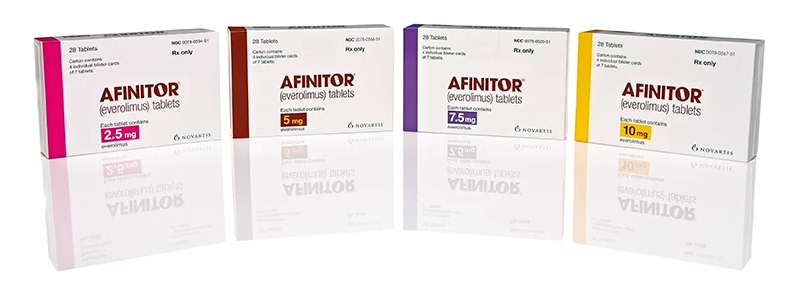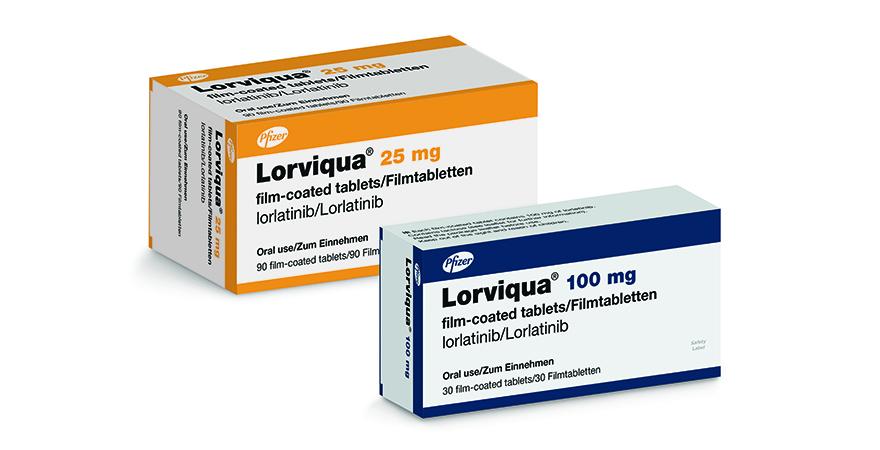Afinitor (everolimus) vs Lorviqua (lorlatinib)
Afinitor (everolimus) vs Lorviqua (lorlatinib)
Afinitor (everolimus) is a targeted therapy known as an mTOR inhibitor, which is commonly used to treat various types of cancer, including advanced renal cell carcinoma, certain types of breast cancer, and neuroendocrine tumors. Lorviqua (lorlatinib), on the other hand, is a third-generation ALK and ROS1 tyrosine kinase inhibitor specifically designed to treat patients with ALK-positive metastatic non-small cell lung cancer (NSCLC) who have developed resistance to earlier ALK inhibitors. When deciding between Afinitor and Lorviqua, it is crucial to consider the specific type of cancer and its molecular profile, as Lorviqua is tailored for ALK-positive NSCLC, while Afinitor has a broader application in various cancers but is not suitable for ALK-driven tumors.
Difference between Afinitor and Lorviqua
| Metric | Afinitor (everolimus) | Lorviqua (lorlatinib) |
|---|---|---|
| Generic name | Everolimus | Lorlatinib |
| Indications | Advanced hormone receptor-positive, HER2-negative breast cancer, advanced neuroendocrine tumors, renal cell carcinoma, subependymal giant cell astrocytoma (SEGA), tuberous sclerosis complex (TSC)-associated renal angiomyolipoma, and TSC-associated partial-onset seizures | ALK-positive metastatic non-small cell lung cancer (NSCLC) |
| Mechanism of action | mTOR inhibitor | ALK and ROS1 tyrosine kinase inhibitor |
| Brand names | Afinitor, Zortress, Votubia, Afinitor Disperz | Lorviqua |
| Administrative route | Oral | Oral |
| Side effects | Mouth ulcers, infections, rash, fatigue, diarrhea, edema, abdominal pain, nausea, fever, decreased appetite, cough, headache | Peripheral neuropathy, cognitive effects, dyspnea, fatigue, weight gain, joint pain, mood effects, diarrhea, hypertension |
| Contraindications | Hypersensitivity to everolimus or other rapamycin derivatives | Hypersensitivity to lorlatinib or any component of the formulation |
| Drug class | mTOR inhibitor, immunosuppressant | ALK and ROS1 inhibitor, antineoplastic agent |
| Manufacturer | Novartis | Pfizer |
Efficacy
Afinitor (Everolimus) Efficacy in Lung Cancer
Afinitor (everolimus) is a medication primarily known for its use in certain types of cancers and tumors. In the context of lung cancer, everolimus has been studied for its efficacy in non-small cell lung cancer (NSCLC), particularly in patients who have progressed after initial treatment with chemotherapy and other targeted therapies. Everolimus works by inhibiting the mammalian target of rapamycin (mTOR), a protein that plays a critical role in the proliferation and survival of cancer cells. Clinical trials have shown that everolimus can provide a modest benefit in terms of progression-free survival in patients with NSCLC, especially in those with specific genetic alterations that make their cancer more susceptible to mTOR inhibition.
However, it is important to note that everolimus is not a first-line treatment for lung cancer and is generally considered when other therapies have failed. The efficacy of everolimus in lung cancer needs to be evaluated on a case-by-case basis, taking into account the patient's overall health, cancer characteristics, and previous treatments. While everolimus does have a role in the treatment of certain lung cancer scenarios, it is not widely used as a standard therapy for lung cancer due to the availability of other more effective targeted treatments and immunotherapies.
Lorviqua (Lorlatinib) Efficacy in Lung Cancer
Lorviqua (lorlatinib) is a newer targeted therapy approved for the treatment of patients with anaplastic lymphoma kinase (ALK)-positive metastatic NSCLC who have progressed on prior ALK inhibitors. Lorlatinib is a third-generation ALK inhibitor designed to penetrate the blood-brain barrier, making it particularly effective for patients with brain metastases, which are common in ALK-positive NSCLC. Clinical trials have demonstrated that lorlatinib has significant efficacy in patients with ALK-positive NSCLC, with high response rates and durable responses, even in those who have failed previous ALK inhibitors.
The efficacy of lorlatinib is particularly notable in its ability to overcome resistance to earlier-generation ALK inhibitors, providing a valuable treatment option for patients with limited alternatives. Its activity against central nervous system metastases is a critical aspect of its efficacy profile, as it addresses a significant unmet need in the treatment of ALK-positive NSCLC. Lorlatinib's efficacy, along with its manageable safety profile, makes it a preferred choice for patients with ALK-positive NSCLC who have relapsed or are refractory to other ALK-targeted therapies.
Regulatory Agency Approvals
Afinitor
-
European Medical Agency (EMA), European Union

-
Food and Drug Administration (FDA), USA

-
Health Canada

-
Pharmaceuticals and Medical Devices Agency (PMDA), Japan

-
Therapeutic Goods Administration (TGA), Australia

Lorviqua
-
European Medical Agency (EMA), European Union

-
Food and Drug Administration (FDA), USA

-
Health Canada

-
Therapeutic Goods Administration (TGA), Australia

Access Afinitor or Lorviqua today
If Afinitor or Lorviqua are not approved or available in your country (e.g. due to supply issues), you can access them via Everyone.org.
How it works

Make an enquiry
Choose the medicine you want to buy, answer a couple of questions, and upload your prescription to speed things up. We’ll get back to you within 24 hours.


Make an enquiry
Choose the medicine you want to buy, answer a couple of questions, and upload your prescription to speed things up. We’ll get back to you within 24 hours.


Breeze through the paperwork
We'll guide you through the required documents for importing unapproved medicine, ensuring you have all the necessary information.


Get a personalized quote
We’ll prepare a quote for you, including medicine costs and any shipping, administrative, or import fees that may apply.


Receive your medicine
Accept the quote and we’ll handle the rest - sourcing and safely delivering your medicine.

Some text on this page has been automatically generated. Speak to your physician before you start a new treatment or medication.
Let's talk
If you have any questions, call us or send us a message through WhatsApp or email:
Contact us




